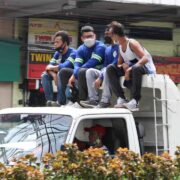
THE Philippines is once again among the 10 worst countries for workers in the world, according to the latest report from the International Trade Union Confederation (ITUC).
In its 2021 Global Rights Index released over the weekend, the group ranked 149 countries based on the degree of respect for workers’ rights and found that the COVID-19 pandemic is being used by government and companies to abuse workers.9
“When COVID-19 hit, we learned who the heroes are. Workers everywhere cared for the sick, put food on our tables, and kept the economy moving. But despite all that, workers are under attack like never before,” said ITUC General Secretary Sharan Burrow.
“Governments and employers exploited the pandemic to exploit the people the world depends on by increasing surveillance, breaking agreements, laying off workers, blocking and intimidating unions and resorting to violence and murder,” she added.
According to the report, 87% of countries violated the right to strike, 79% of them violated the right to collectively bargain, and 74% of countries excluded workers from the right to establish and join a trade union.
Key findings also revealed that the number of countries that impeded the registration of unions increased from 89 in 2020 to 109 in 2021, while the number of countries which denied or constrained freedom of speech increased from 56 last year to 64 this year.
Additionally, the report said workers were exposed to violence in 45 countries, had no or restricted access to justice in 65% of countries, and experienced arbitrary arrests and detention in 68 countries.
Along with the Philippines, Bangladesh, Belarus, Brazil, Colombia, Egypt, Honduras, Myanmar, Turkey, and Zimbabwe were recognized as the worst countries for working people in 2020.
“Workers and their representatives in the Philippines remained particularly vulnerable to violent attacks, intimidation and arbitrary arrests,” noted ITUC.
“Trade unionists, maliciously red-tagged by President Duterte with even extra judicial killings sanctioned in his speeches, remained under immediate threat of the police and the army, which conducted targeted raids against them. Twenty-eight union representatives were illegally arrested and detained in March and December, and seven union leaders were killed between March 2020 and April 2021,” it added.
ITUC also cited the Anti-Terrorism Act of 2020, saying that it may grant “even more extended powers to the police and the military to attack and harass workers and trade union activists.”
In response, Malacañang expressed sadness over the Philippines’ inclusion in the list.
“Well, nalulungkot po tayo diyan pero sigurado po ako na iyong estado ng mga manggagawa ay apektado rin po ng pandemya dahil papunta na po tayo sa pangalawang taon ng pandemya (We are saddened by the report but I am sure the state of workers was affected by the pandemic since we are heading towards the second year of the pandemic),” Presidential Spokesperson Harry Roque said Tuesday, July 6.
“At naniniwala tayo na habang dumadami ang hanay ng nababakunahan at nabubuksan ang ating ekonomiya, mas bubuti rin ang kalagayan ng mga manggagawa sa ating bayan (We believe that as the number of vaccinated people increases and as we reopen our economy, the plight of the workers in the country will improve),” he added. n






